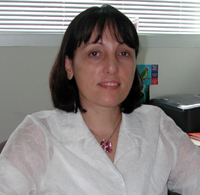 |
Duygu Dee Harrison-Findik, Ph.D. |
The oxygen-carrying mineral boosts a person’s immune system, cognitive development and energy metabolism. Without it, a person becomes tired, irritable and even depressed.
But, patients with liver diseases, such as alcoholic liver disease and chronic hepatitis C infection, frequently exhibit iron overload, Dr. Harrison-Findik said. Increased iron levels in the liver are associated with hepatic injury and a poor prognosis.
UNMC’s assistant professor of internal medicine in the section of gastroenterology-hepatology wants to better understand the underlying mechanisms of iron accumulation, which are largely unknown.
Dr. Harrison-Findik took a step forward this past fall when, on her first submission, she received a $1.1 million Research Project Grant (R01) from the National Institutes of Health (NIH) to study the regulation of iron metabolism in alcoholic liver disease over the next five years. R01 grants provide support for health-related research and development based on the mission of the NIH.
“We’re contributing to UNMC — and the medical research — in our own quiet way,” Dr. Harrison-Findik said. “Our success is shared with the research associates, technicians, individuals in core facilities and the other ‘unnamed soldiers’ who have contributed. This was not achieved in isolation — it’s all about teamwork.”
Dr. Harrison-Findik is particularly grateful to the NIH, the National Institute on Alcohol Abuse and Alcoholism and her mentor, UNMC College of Medicine Dean John Gollan, M.D., Ph.D., whom she previously worked with at the University of Adelaide, Australia.
“Dee relishes a challenge and, in these economic times, for her to be funded on the first review is unusual and reflects the high quality of her work,” Dr. Gollan said. “When I moved to UNMC in 2001, Dee immigrated from Australia to establish my lab, initially, in Bennett Hall and then in DRC I. Without her, my research would not have gotten off the ground.
“We are fortunate to have recruited such a delightful and talented scientist to UNMC. She is mindful of her husband, Steven, and daughter, Sara, and is a creative, feisty, cheerful and aggressive scientist who is most enjoyable to work with in the laboratory. She has a great future in research.”
Since joining UNMC in 2002, Dr. Harrison-Findik has focused her research on iron overload in alcoholic liver disease.
Changes in intestinal permeability were thought to be the underlying mechanism of enhanced iron absorption in alcoholic liver disease, she said. However, her team’s recent findings, published in the Journal of Biological Chemistry (2006) and Hepatology (2007), strongly suggest that iron overload in alcoholic liver disease is a regulated event. The central player, she said, is an iron regulatory hormone called hepcidin, which is synthesized in the liver.
Alcohol-induced oxidative stress suppresses hepcidin transcription in the liver, which then leads to increased iron absorption in the intestine and iron accumulation in the liver. Iron and alcohol act synergistically to cause liver injury.
“We were delighted to see that Japanese researchers recently confirmed our findings and demonstrated that the same events not only happen with alcoholic liver disease, but also with chronic hepatitis C infection,” Dr. Harrison-Findik said of the Japanese research team’s work that was published in Gastroenterology 2008 (vol. 134). “These findings are exciting because they indicate that different liver diseases share common pathways to induce iron overload and liver injury.
“More importantly, it opens up a window of opportunity to tailor common diagnostic markers and treatment schemes for liver diseases. It also highlights the importance of oxidative stress in liver diseases. The treatment with antioxidants may need to be revisited.”
|
|
“Hepcidin already has been recognized as a potential diagnostic marker and a therapeutic agent in various iron disorders including anemia of chronic disease, iron-deficiency anemia and chronic kidney diseases,” she said. “Our work indicates that hepcidin also is an attractive candidate for the treatment of liver diseases, whereby iron overload induces liver injury.”
Dr. Harrison-Findik said notification of her NIH grant helps fulfill a personal goal: to be a role model for the next generation of female scientists.
From her Durham Research Center office, the wife and mother of a soon-to-be teenager knows of the sacrifices necessary to run a successful laboratory, but she also knows of its rewards.
She encourages UNMC to continue to invest and mentor new and junior faculty so they, too, “can find their own niche and blossom in their own way.”
“We should not hear the sound of one hand clapping,” she said. “We should have both hands clapping.”
A native of Istanbul, Turkey, Dr. Harrison-Findik studied veterinary medicine at Istanbul University in Turkey (1983) and earned her Ph.D. at Justus-Liebig University in Giessen, Germany (1989). She did her post-doctorate training at Tufts University in Boston and the University of Adelaide Australia.
Her commitment to molecular medicine — and the next generation of female scientists — is strong.
“We represent a beacon of hope for the next generation of female investigators to believe in themselves and reach toward the top,” she said, “not in an egocentric way, but to help expand scientific knowledge.”